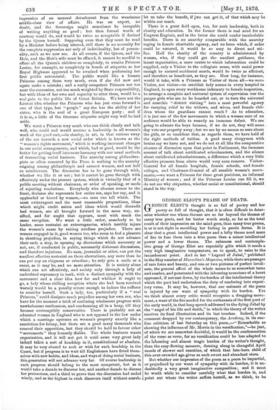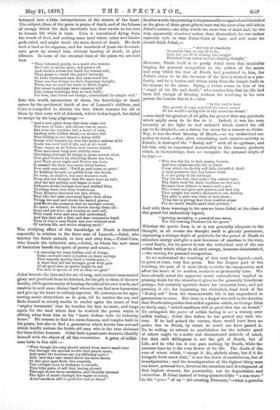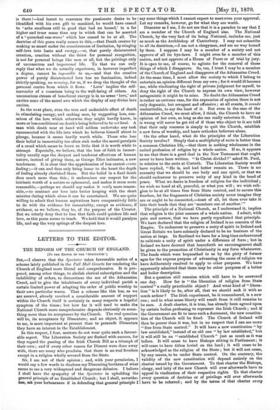GEORGE ELIOT'S PRAISE OF DEATH.
GEORGE ELIOT'S thought is so fall of poetry and her poetry so full of thought, that it is often difficult to deter- mine whether one whose themes are so far beyond the themes of many true poets, and far better worth study, so far as the total result of their impression on the mind goes, than many true poems, is or is not right in moulding her feeling in poetic forms. It is clear that a great intellectual power and a lofty theme need more of fire to fuse them into a true poem than a minor intellectual power and a lower theme. The calmness and contempla- tive grasp of George Eliot are especially gifts which it needs a very high imaginative temperature, so to speak, to raise to the incandescent point. And in her "Legend of Jabal," published in the May number of Macmillan's Magazine, while there are passages of rare force and beauty, and one or two pictures of perfect loveli- ness, the general effect of the whole seems to us somewhat tame and sombre, and penetrated with the labouring monotone of a heart oppressed, if not cast down, by the burden of the intellectual theory which the poet had undertaken the duty of rendering into exposi- tory verse. It may be, however, that our estimate of the poem is injured by our want of sympathy with its burden. Yet we think almost every critic would recognize a dragging move- ment, a want of the fire needed for the euthanasia of the first poet of the early world, in that long speech addressed to the dying Jabal by the "angel of his life and death," in which the theory of the writer receives its final illustration and its last touches. Indeed, if the comment dropped by our contemporary, the Academy, in its one- line criticism of last Saturday on this poem,—" Remarkable as showing the influence of Mr. Morris in the versification,"—be just, of which we are somewhat doubtful, it would be the condemnation of the verse as verse, for no versification could be less adapted to the labouring and almost tragic burden of the writer's thought, than the easy-flowing measure, dancing along in changeful April moods of shower and sunshine, of which that late-born child of this over-crowded age gives us such sweet and abundant store.
But whether our impression of the poem as a poem be impartial, or prejudiced by our want of sympathy with its burden, it is un- doubtedly a very great imaginative composition; and it mast be worth while to consider carefully what that burden is, and point out where the writer .suffers-herself, as we think, to be betrayed into a false interpretation of the secrets of the heart. The subject, then, of the poem is praise of death, and of the fulness of energy which the dark inevitable fate that awaits us has lent to human life while it lasts. Cain is introduced flying from the wrath of God, and seeking some land where other and kinder gods ruled, and might remit the stern decree of death. He finds such a land as he supposes, and for hundreds of years his descend- ants grow up around him, without hearing of death, in glad idleness. In some of the sweetest lines of the poem we are told
how
" They laboured gently, as a maid who weaves Her hair in mimic mats, and pauses oft And strokes across her hand the tresses soft, Then peeps to watch the poised butterfly Or little burthened ants that homeward hie.
Time was but leisure to their lingering thought, There was no need for haste to finish aught ; But sweet beginnings were repeated still Like infant babblings that no task fulfil ; For love, that loved not change, constrained the simple will."
Into this world, unconscious of doom, the knowledge of death enters by the accidental death of one of Lamech's children, and Cain is compelled to disclose the fate which remains for all of them by that stern will of Jehovah, which be has hoped, but failed to escape by his long pilgrimage :—
"And a new spirit from that hour came o'er
The race of Cain ; soft idlesse was no more, But even the sunshine had a heart of care, Smiling with hidden dread,—a mother fair Who folding to her breast a dying child Beams with feigned joy that but makes sadness mild.
Death was now lord of life, and at his word Time, vague as air before, new terrors stirred, With measured wing now audibly arose Throbbing through all things to some unseen close.
Now glad Content by clutching Haste was torn, And Work grew eager and Device was born.
it seemed the light was never loved before, Now each man said, "Twill go and come no more.'
No budding branch, no pebble from the brook, . No form, no shadow, but new dearness took From the one thought that life must have an end ; And the last parting now began to send Diffusive dread through love and wedded bliss, Thrilling them into finer tenderness. Then Memory disclosed her face divine, That like the calm nocturnal lights doth shine Within the soul and shows the sacred graves, And Shows the presence that no sunlight craves, No space, no warmth, but moves among them all ; Gone and yet here, and coming at each call, With ready voice and eyes that understand, And lips that ask a kiss, and dear responsive hand. Thus to Cain's race Death was tear-watered seed Of various life, and action-shaping need."
The vivifying effect of this knowledge of Death is described especially in relation to the three -eons of Lamech,—Jabal, who teaches the dumb animals to love and obey him,—Tubal-Cain, who founds the industrial arts,—Jubal, in whom the new sense -of limitation breeds the spirit of poetry and music,— " A yearning for some hidden soul of things, Some outward touch complete on inner springs That vaguely moving bred a lonely pain,— A want that did but stronger grow with gain Of all good else, as spirits might be sad For lack of speech to tell us they are glad."
-Jabal invents the lyre and the art of song, and receives unmeasured zlory and gratitude from his kindred, for his gift to them of the new faculty, till he grows weary of hearing the echo of his own words, and resolves to seek some distant land where he can find new harmonies and give up his heart to solitary raptures. He journeys on for ages, :sowing music everywhere as he goes, till he reaches the sea, and finds himself so utterly unable to render again the music of that 4 mighty harmonist that he touches his lyre no more, and longs again for the land where first he realized the power which is -ebbing away from him as his "heart widens with its widening home." He returns to find his name famous, and temples built in his praise, but also to find a generation which knows him not and which hardly notices the feeble old man who is the true claimant for these divine honours. Jabal feels a passionate desire to identify himself with the object of all this veneration. A germ of selfish- ciess lurks in him still :— " What though his song should spread from man's small race
Out through the myriad worlds that people space, And make the heavens one joy-diffusing quire ? Still, 'said that vast would throb the keen desire Of this poor aged flesh, this eventide, This twilight soon in darkness to subside, This little pulse of self that, having glowed Through thrice three centuries, and divinely strewed The light of music through the vague of sound, Ached =mikes* still in good that had no bound."
mother words, the yearning to be personally recognizedand identified as the giver of these great gifts to man was the poor alloy still left in Jubal's nature,—an alloy which the mere fear of death had, by the way, apparently stimulated rather than diminished, for our author expressly tells us that Tubal-Cain at least, and still more we should think Jabal,— . . . . " wot not of treachery, Or greedy lust, or any ill to be, Save the one ill of sinking into naught Banished from action and act-shaping thought."
However, Death itself is to purify Jabal from this insatiable longing for personal recognition as the author of the music and song which the fear of Death had generated in him, for Jubal's claim to be the inventor of the lyre is treated as a pro- fanity, and he is beaten and driven away from the temple built in his honour, to die alone. Dying, a vision comes to him of the "angel of his life and death," who teaches him that his life had been full enough of blessing without his receiving in his own person the honour due to it,—that
"in thy soul to bear
The growth of song, and feel tho sweet unrest Of the world's spring-tide in thy conscious breast,"
—was itself the greatest of all gifts, far greater than any gratitude which might seem to be due to it. Indeed, it was the very intensity of the light he had radiated which caused his old age to be despised,—as a shrine too mean for a rumour so divine. Nay, it was the final blessing of Death,—so we understand our author to teach, —that, after stimulating such creative activity as Jabal's, it destroyed the "fleshly self " with all its egotisms, and left him only an impersonal immortality in that human gladness which, in its rejoicings, does not recognize the personal origin of its joys: "This was thy lot, to feel, create, bestow, And that immeasurable life to know
From which the fleshly self falls shrivelled, dead. A seed primeval that has forests bred.
It is the glory of the heritage Thy life has left, that makes thy outcast age ; Thy limbs shall lie, dark, tombless on this sod, Because thou shinest in man's soul a god, Who found and gave new passion and new joy, That naught but earth's destruction can destroy. Thy gifts to give was thine of men alone ; 'Twas but in giving that thou could'st atone For too much wealth amid their poverty."
And with these warnings in his ears we leave Jabal, at the close of this grand but melancholy legend,
"Quitting mortality, a quenched sun-wave, The All-creating Presence for his grave."
Whether the poetic form is or is not generally adequate to the thought, at all events the thought itself is gravely passionate, expressing a strange depth of gratitude for the power of Death to stimulate energy and give a new keenness of emotion to the race, — and finally, for its power to rob the individual soul of the one selfishhusk which clings to all such energy, however disinterested, — the craving for personal recognition.
So we understand the teaching of this very fine legend,—and, in parts at least, very fine poem. But the deepest part of the teaching, the part of it most likely to strike the imagination and affect the heart of its readers, seems to us profoundly false. We have already noted the apparent moral contradiction implied in praising death for the stimulus it gives to the generally beneficent perhaps, but certainly egotistic desire for immortal fame, and yet praising it also for separating the shrivelled, dead husk of the "fleshly self" from the immeasurable life it has engendered in generations to come. But there is a deeper vice still in the doctrine that Death extinguishes that selfish egotism which, as George Eliot so finely says, "ached smallness still in good that has no bound." To extinguish the power of selfish feeling is not a victory over selfish feeling; Jabal dies before he has gained any such vic- tory. If he had gained the victory, there would have been no praise due to Death, by which he could not have gained it. To he willing to submit to annihilation for the infinite good of others might be a noble and disinterested attitude of mind, but then each willingness is not the gift of Death, but of Life, and he who has it can gain nothing by Death, while the universe loses by it the very flower of its life. The death of the corn of wheat which, "except it die, abideth alone, but if it die bringeth forth much fruit," is not the death of annihilation, but of transfiguration ; and the transfiguration of the highest thing man can know, personal love, involves the retention and development of that highest element, the personality, not its degradation and extinction. If Jubal instead of being quenched like "a sun-wave" in the "grave" of an "All-creating Presence,"—what a, paradox is there l—had learnt to renounce the passionate desire to be identified with his own gift to mankind, he would have ceased to 'ache smallness still in good that had no bound,' in a far higher and truer sense than any in which that can be asserted of a 'quenched sun-wave' which has ceased to be at all. The doctrine of this poem really comes to this,—that Death creates by making us smart under the consciousness of limitation, by stinging self-love into haste and energy,—or, that purely disinterested creation, creation without the thirst for personal recognition, is not for personal beings like men at all, but the privilege only of unconscious and impersonal life. To that we can only reply that what we do actually experience, in however imperfect a degree, cannot be impossible to us,—and that the creative power of purely disinterested love has no fascination, indeed strictly speaking, no meaning, for us, if we drop the thought of the personal centre from which it flows. 'Love' implies the self- surrender of a conscious being to the well-being of others. An unconscious stream of beneficent energy is in no sense 'love,' and excites none of the moral awe which the display of any divine love excites.
In the next place, even the true and undeniable effect of death in stimulating energy, and making men, by suggesting loss, con- scious of the love which otherwise they might hardly know, is more or less conditional on death's beingbelieved to be not final. A man with death near at hand will seldom undertake any task unconnected with the life into which he believes himself about to plunge, because it seems hardly worth while. Those who lose their belief in immortality too often sink under the moral paralysis of a creed which seems to leave so little that it is worth while to attempt. Especially, we believe, that the loss of faith in immor- tality usually saps the deepest and tenderest affections of human nature, instead of giving them, as George Eliot intimates, a new tenderness. It is clear that the apprehension of loss cannot create feeling ;—it can and does only bring home to the heart the depth of feeling already cherished there. But the belief in a final death does much more than this ; it undermines our respect for the intrinsic worth of a nature so ephemeral, and makes it seem more reasonable,—perhaps we should say makes it really more reason- able,—to contract our love into better keeping with the short minutes during which alone it can be entertained. We are quite willing to admit that human aspirations have comparatively little to do with the evidence for immortality, except as evidence, if evidence, as we believe, they be, of the purpose of the Creator. But we utterly deny that to lose that faith could quicken life and love, as this poem seems to teach. We hold that it would paralyze life, and sap the very springs of the deepest love.
































 Previous page
Previous page